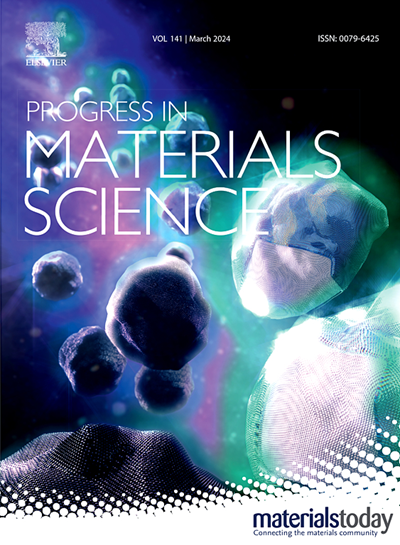Upcycling and recycling of spent battery waste for a sustainable future: Progress and perspectives
IF 40
1区 材料科学
Q1 MATERIALS SCIENCE, MULTIDISCIPLINARY
引用次数: 0
Abstract
The urgency of addressing the environmental and resource challenges posed by spent lithium-ion batteries (LIBs) has led to significant advancements in recycling and upcycling methodologies. This work aims to provide a comprehensive understanding of the progress made for LIB recycling and upcycling, offering perspectives for achieving a circular economy in battery technology. The review examines the latest innovations in LIB material recovery, focusing on both conventional recycling techniques and emerging upcycling strategies. It explores the motivation and importance of recycling spent LIBs, showing the critical need for sustainable solutions. A comprehensive overview of LIB recycling methodologies is provided, including pretreatment, preprocessing, pyrometallurgical, hydrometallurgical, bioleaching, direct recovery processes, electrochemical processes, and deep eutectic solvents. Emphasis is placed on the advanced upcycling of the cathode, anode, and separator materials, exploring composition/crystallisation engineering and structural modifications, including doping and surface coating. Furthermore, upcycling spent LIB materials into high-value products like catalysts and graphene is explored. The environmental impact, legislative landscape, and socioeconomic implications of battery recycling are critically analysed, with life cycle assessments underscoring the ecological benefits of these processes. Global perspectives on battery recycling practices are also examined, considering the varied approaches across different regions. Additionally, integrating artificial intelligence and the internet of things in optimising battery recycling is explored, demonstrating their potential to enhance efficiency and sustainability. The review concludes by identifying current challenges and proposing recommendations for future research and policy development.


为可持续发展的未来升级回收和回收废旧电池:进展和前景
解决废旧锂离子电池(lib)带来的环境和资源挑战的紧迫性促使回收和升级利用方法取得了重大进展。这项工作旨在全面了解锂离子电池回收和升级利用的进展,为实现电池技术的循环经济提供视角。该审查审查了LIB材料回收的最新创新,重点是传统的回收技术和新兴的升级回收策略。它探讨了回收废旧lib的动机和重要性,显示了对可持续解决方案的迫切需求。提供了LIB回收方法的全面概述,包括预处理,预处理,火法冶金,湿法冶金,生物浸出,直接回收过程,电化学过程和深共晶溶剂。重点放在阴极、阳极和隔膜材料的先进升级循环上,探索成分/结晶工程和结构修改,包括掺杂和表面涂层。此外,还探索将废锂材料升级为催化剂和石墨烯等高价值产品。对电池回收的环境影响、立法格局和社会经济影响进行了批判性分析,并对这些过程的生态效益进行了生命周期评估。考虑到不同地区的不同方法,还研究了电池回收实践的全球视角。此外,还探索了将人工智能和物联网整合到优化电池回收中,展示了它们提高效率和可持续性的潜力。报告的结论是确定当前的挑战,并为未来的研究和政策制定提出建议。
本文章由计算机程序翻译,如有差异,请以英文原文为准。
求助全文
约1分钟内获得全文
求助全文
来源期刊

Progress in Materials Science
工程技术-材料科学:综合
CiteScore
59.60
自引率
0.80%
发文量
101
审稿时长
11.4 months
期刊介绍:
Progress in Materials Science is a journal that publishes authoritative and critical reviews of recent advances in the science of materials. The focus of the journal is on the fundamental aspects of materials science, particularly those concerning microstructure and nanostructure and their relationship to properties. Emphasis is also placed on the thermodynamics, kinetics, mechanisms, and modeling of processes within materials, as well as the understanding of material properties in engineering and other applications.
The journal welcomes reviews from authors who are active leaders in the field of materials science and have a strong scientific track record. Materials of interest include metallic, ceramic, polymeric, biological, medical, and composite materials in all forms.
Manuscripts submitted to Progress in Materials Science are generally longer than those found in other research journals. While the focus is on invited reviews, interested authors may submit a proposal for consideration. Non-invited manuscripts are required to be preceded by the submission of a proposal. Authors publishing in Progress in Materials Science have the option to publish their research via subscription or open access. Open access publication requires the author or research funder to meet a publication fee (APC).
Abstracting and indexing services for Progress in Materials Science include Current Contents, Science Citation Index Expanded, Materials Science Citation Index, Chemical Abstracts, Engineering Index, INSPEC, and Scopus.
 求助内容:
求助内容: 应助结果提醒方式:
应助结果提醒方式:


